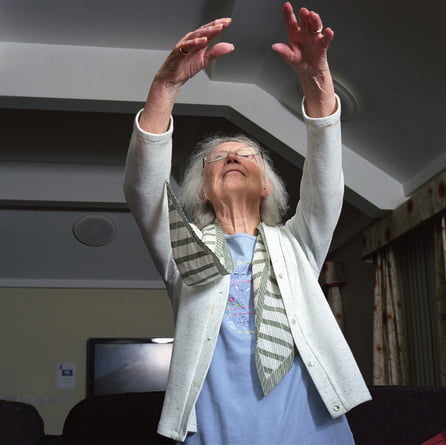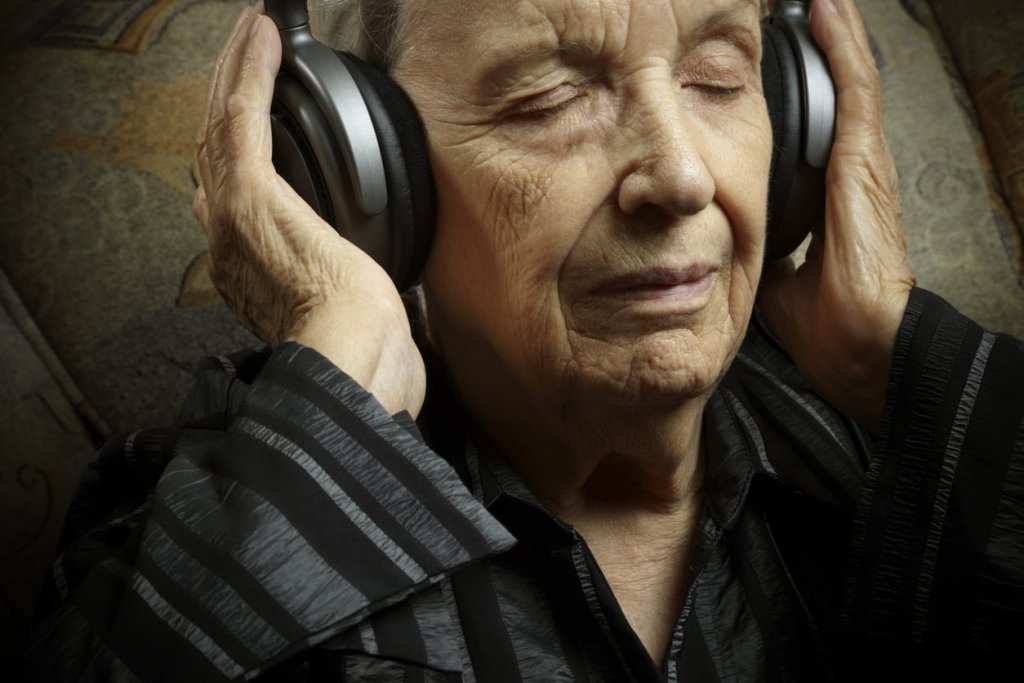In this blog for our dementia series, Jenny McCleery, Consultant Psychiatrist looks at the latest Cochrane evidenceCochrane Reviews are systematic reviews. In systematic reviews we search for and summarize studies that answer a specific research question (e.g. is paracetamol effective and safe for treating back pain?). The studies are identified, assessed, and summarized by using a systematic and predefined approach. They inform recommendations for healthcare and research. on creative arts therapies for people with dementia.
Page last updated: 08 August 2023, to include the latest evidence on dance therapies.
What might arts therapies do for people with dementia?
Living well with dementia is certainly possible. But it would be dishonest not to acknowledge that the lives of people with dementia can be bleak at times. They often feel isolated. Communication with others becomes difficult. Apathy, depression and anxiety are common and very often hard to treat. There can be no doubt about the need to find a range of effective ways to alleviate emotional distress and improve the overall well-being of people with dementia.

Arts therapies?
The arts, including music, dance and visual arts, can potentially bypass barriers to self-expression resulting from deteriorating verbal skills. They offer exciting possibilities to work with people with dementia in creative ways and in a variety of forms and settings, ranging from groups with a largely recreational aim to individual arts therapies.
In many countries, arts therapies are regulated professions and those calling themselves arts therapists must have completed training approved by a professional body. For example, in the UK, art therapists, drama therapists and music therapists are regulated by the Health and Care Professions Council. Registered therapists will have received training in the use of their art form as a psychological interventionA treatment, procedure or programme of health care that has the potential to change the course of events of a healthcare condition. Examples include a drug, surgery, exercise or counselling. , although not all will necessarily have specific training or experience with dementia.
“Where words leave off, music begins” (Heinrich Heine, German poet). A patient of mine, a psychotherapist herself, who had spent her working life helping others through words, was deeply distressed by difficulties with language quite early in her Alzheimer’s disease, and attempts to talk to her about her feelings only magnified the problem. She was also an amateur musician and music therapy proved to be a lifeline to her, allowing her to develop a relationship with a helping professional without relying on speech. Such experiences leave powerful impressions. But did her rather unusual background make her unique, or can arts therapy help many people with dementia? Is formal arts therapy necessary or can we see benefits from other arts-based interventions, which may be easier to reproduce widely or less expensive? And when in the course of dementia might the benefits be greatest? In order to answer these questions, we need to look for high quality research which compares the effects of arts-based interventions with control interventions.
Cochrane Reviews on arts therapies
Three Cochrane reviewsCochrane Reviews are systematic reviews. In systematic reviews we search for and summarize studies that answer a specific research question (e.g. is paracetamol effective and safe for treating back pain?). The studies are identified, assessed, and summarized by using a systematic and predefined approach. They inform recommendations for healthcare and research. examine music-based therapeutic interventions (published July 2018), art therapy for people with dementia (published September 2018) and dance movement therapy for dementia (updated August 2023).
The reviews included only randomisedRandomization is the process of randomly dividing into groups the people taking part in a trial. One group (the intervention group) will be given the intervention being tested (for example a drug, surgery, or exercise) and compared with a group which does not receive the intervention (the control group). controlled trialsA trial in which a group (the ‘intervention group’) is given a intervention being tested (for example a drug, surgery, or exercise) is compared with a group which does not receive the intervention (the ‘control group’). (RCTs), in an attempt to identify unbiased evidence for efficacyThe extent to which an intervention (for example a drug, surgery, or exercise), produces a beneficial result under ideal conditions.. However, while the dance movement therapy review limited inclusion to RCTs in which interventions were delivered by qualified dance therapists, the review on music-based therapeutic interventions took a broader view and attempted to include all RCTs in which music had been used with a therapeutic purpose. So the authors included studies where the intervention was delivered by a qualified music therapist, but also those ‘based on a therapeutic relationship’ with another professional where at least two other indicators were met: a stated therapeutic objective, a clinical indication or referral for the intervention, matching of the music with the individual, and active participation of the person with dementia. In the art therapy review, the art‐therapy intervention was delivered by individuals from a wide range of backgrounds with varying levels of experience and expertise. No doubt these criteria could be debated, but they represent a welcome attempt to make the results of the review widely applicable.
Therapies using dance

The dance movement therapy review only included one studyAn investigation of a healthcare problem. There are different types of studies used to answer research questions, for example randomised controlled trials or observational studies. which took place in Hong Kong and involved 204 people; some had mild dementia and some had even milder problems with thinking and memory. In the study, the researchers compared dance movement therapy with exercise and with a waiting list. They compared the groups at the end of the therapy and then again three and nine months later.
The study showed there may be little or no difference between dance movement therapy and either exercise or waiting list in terms of their effects on mental well‐being or cognition. There may be a small beneficial effect of dance movement therapy on alleviating depression. This effect was still present up to nine months after the end of the therapy but it’s hard to say how meaningful the impact on depression may be.
Based on the limited evidence available, it is really not possible to say whether dance movement therapy may be helpful for people with mild dementia, and it’s not possible to say anything about its effects in moderate or severe dementia.
Therapies using art
Similarly, the review on art therapies also highlights an evidence gap. The authors only included two studies with a total of 60 people with dementia, leaving the authors to conclude that “there is insufficient evidence about the efficacy of art therapy for people with dementia”.
Therapies using music
The review of music-based therapeutic interventions, in contrast, includes 22 studies including a total of 1097 people with dementia. This reflects in part a much larger literature to draw on and in part the review authors’ broader inclusion criteria. All of the people in the studies stayed in nursing homes or hospitals, although the severity of the participants’ dementia varied.
From their results, the authors could be moderately confident that music‐based treatments improve symptoms of depression and overall behavioural problems, but not specifically agitated or aggressive behaviour. They may also improve anxiety and emotional well‐being including quality of life, although the authors were less confident about these results. Music-based treatments may have little or no effect on cognition.

The authors went on to try to address as best they could, using a series of post hoc sensitivityA measure of a screening or diagnostic test’s ability to correctly detect people who have the disease. analyses, the thorny issue of whether professional qualifications in music therapy mattered in this context. This is important because trained music therapists are rare and relatively expensive, while the problem these studies address is common. If only highly qualified music therapists can deliver effective interventions, then our ability to help large numbers of people will be reduced. In 12 of the included studies, the interventions were definitely delivered by a qualified music therapist, in four this was unclear from the reports and in six there was no qualified music therapist involved. Excluding those six studies from analyses had little effect on the results. The authors acknowledge that this kind of between-study comparison is not an ideal method to address the effect of therapist training and targeted studies would be better. There may, for example, be confounding if studies using trained therapists recruit patients with more complex problems.
Another issue raised by the review authors was conflict of interest. We are used to dealing with financial conflicts of interest in drug studies, but less comfortable with identifying or discussing other potential conflicts of interest. However, small, relatively new professions can have a considerable interest in proving their own value and the authors rightly tried to consider whether there might be intellectual or professional as well as financial conflicts of interest.
Where does this leave us?
So what can we conclude from these reviews? The evidence on arts therapies for dementia is still at quite an early stage of development. RCTs are small, many have quality limitations, and the range of interventions and settings studied is still narrow. However, the apparent benefit of music-based interventions on depressive symptoms, anxiety and emotional well‐being is encouraging. Researchers should bear in mind the magnitude of the problem and should try to develop and test interventions which can be scaled up to reach significant numbers of people. Similarly, systematic reviewsIn systematic reviews we search for and summarize studies that answer a specific research question (e.g. is paracetamol effective and safe for treating back pain?). The studies are identified, assessed, and summarized by using a systematic and predefined approach. They inform recommendations for healthcare and research. will be most useful if they take a fairly broad view of the potential therapeutic use of the creative arts in dementia care and cover interventions of varying complexity, facilitated by people with different professional backgrounds.
References
Lyketsos CG, Lopez O, Jones B, Fitzpatrick AL, Breitner J, DeKosky S. PrevalenceThe proportion of a population who have a particular condition or characteristic. For example, the percentage of people in a city with a particular disease, or who smoke. of neuropsychiatric symptoms in dementia and mild cognitive impairment: results from the cardiovascular health study. JAMA 2002;288(12):1475-83. Available from: http://jamanetwork.com/journals/jama/fullarticle/195320
van der Steen JT, Smaling HJA, van der Wouden JC, Bruinsma MS, Scholten RJPM, Vink AC. Music-based therapeutic interventions for people with dementia. Cochrane Database of Systematic Reviews 2018, Issue 7. Art. No.: CD003477. DOI: 10.1002/14651858.CD003477.pub4. http://cochranelibrarywiley.com/doi/10.1002/14651858.CD003477.pub4/full
3. Karkou V, Aithal S, Richards M, Hiley E, Meekums B. Dance movement therapy for dementia. Cochrane Database of Systematic Reviews 2023, Issue 8. Art. No.: CD011022. DOI: 10.1002/14651858.CD011022.pub3. https://www.cochranelibrary.com/cdsr/doi/10.1002/14651858.CD011022.pub3/full
4. Deshmukh SR, Holmes J, Cardno A. Art therapy for people with dementia. Cochrane Database of Systematic Reviews 2018, Issue 9. Art. No.: CD011073. DOI: 10.1002/14651858.CD011073.pub2 https://www.cochranelibrary.com/cdsr/doi/10.1002/14651858.CD011073.pub2/full
Join in the conversation on Twitter with @CochraneUK #dementiaspotlight, or leave a comment here below the blog.
Jenny McCleery has nothing to disclose.


An encouraging start. I would expect art therapies to have a beneficial effect on the wellbeing of people with various conditions including Dementia. We know that music and memory have a powerful link and the benefits of music and artistic expression are long documented and already is use within the health care system. Long may it continue and advance.
I didn’t know that one could use arts therapies for dementia. It is not fatal and symptoms of which are often ignored by many people. Ignoring the symptoms of such disease could have catastrophic effects on the health of a person. So, the appearance of any signs which indicates that the person may have affected by dementia shouldn’t be underestimated. Proper medication and care should be given to such person.
I run a ukulele band with members of our U3A. We now visit some local day centres with Alzheimer’s patients and our audience responds to us and joins in singing. We have no doubt this is doing us all good.